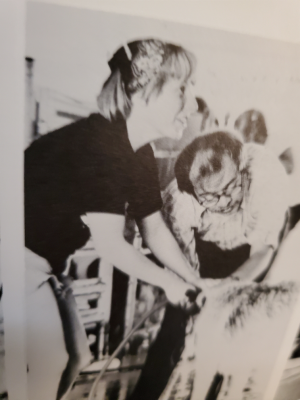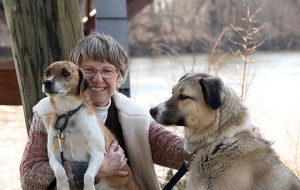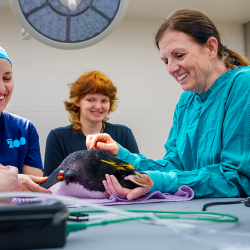Dr. Jane Wall Lacher earned three degrees from Michigan State University: a bachelor of science degree in medical technology in 1975, a bachelor of science degree in poultry science in 1976, and a doctor of veterinary medicine degree from the College of Veterinary Medicine in 1979. Dr. Lacher is a retired laboratory animal veterinarian.
What is your current job, and what led you to your current career path?
I am retired from my position as a laboratory animal veterinarian in the field of toxicology. That was not my first choice as I had aspirations of going into dairy medicine. But I had three strikes “against” me in 1979: I was not raised on a farm, I was short, and I was female. However, an experience with laboratory rodents prior to veterinary school prompted me to explore that branch of veterinary medicine after graduation.

That field was a challenging one because of fast changes regarding care for lab animals and dealing with emerging societal attitudes towards animals in research. The societal changes were not always positive. Yet, positive changes resulted from the negative. I was able to see, participate, and, to some extent, help shape attitude changes within toxicology. Perhaps one of my most gratifying projects was being able to participate on an ILAR (Institute of Laboratory Animal Resources) committee to rewrite and expand on an older reference. The new reference is entitled Recognition and Alleviation of Pain in Laboratory Animals. Because of the work I had done in my career, I was assigned the chapter on Humane Endpoints. It is my hope that the reference will continue to provide important information to scientists when they must utilize laboratory animal animals in critical areas of their research.
My compassion for my babies at work also spilled over into rescue. I have had numerous dogs over the years, and all have been rescues. My first was a beagle mix that a vet tech needed to home (one of her bitches got bred by an unknown boy). We currently have five. We have taken in all sizes and breeds, from greyhounds to a chihuahua-min pin mix.
You’ve been a longtime supporter of the College and MSU in many ways, why is it important to you to give back?
I have always given back to MSU because of an excellent matching fund program through my employer. It was easy and there was always a competition between MSU and University of Michigan alumni as to which group would contribute the most money. As the years progressed, I became more aware of the huge financial burden veterinary students were and are under. At a certain point, my husband and I decided to make a more substantial scholarship commitment to the school that would benefit students. They should be able to focus on learning without worry about the financial aspects of education.
What advice would you give to current veterinary students, or students interested in veterinary medicine as a career?
Perseverance and commitment are critical to your career in veterinary medicine. There will always be hard days no matter which path each student chooses to follow. But the good days will outnumber the bad. One always needs to remember the commitment to each animal. As I look back on my career, being a member of this profession was not just a job. It was, and is who I am. I am certain I am not alone in that belief.

How has your MSU veterinary education shaped your life?
My MSU veterinary education is pretty much my life. I am a veterinarian at my core, and bleed green.
What was the most interesting class you took and why?
My most interesting class was actually one I took before entering veterinary school. It was a class in medical mycology. I had never realized how ubiquitous fungi were in our environment and how they could impact both animals and people. Again, the professor was one who cared about his students and that they learned about fungi.
What’s something you learned in veterinary school that you still use today?
While seemingly small, a professor mentioned the importance of bandaging a patient. He said that one could be the best surgeon, but if your bandaging was sloppy, the client would/could base their opinion of your work based on that appearance. That is so true, no matter what one does: perception is reality. I always felt it was important to be open and honest about my work in toxicology because people, right or wrong, will form an opinion about animals in research. It is best if they have correct information and understanding of the work “under that bandage.”

Who was your favorite professor and why?
Dr. Kent Ames was one of my favorite professors. He cared about students and cared that they learned the subjects.
What are your hobbies or interests outside of veterinary medicine?
I enjoy gardening, photography, and playing my guitar. I also enjoy being a canine foster failure. We currently have five rescue dogs, and a larger number that have graced our home with their presence over the years. They always managed to find me.
What’s your favorite way to celebrate being a Spartan?
We love being Green and attending football/basketball games. But my favorite way to celebrate is by giving back to the College and MSU in general. Helping others to become a Spartan gives me a great deal of joy.



